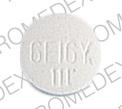Tripelennamine and Alcohol/Food Interactions
There is 1 alcohol/food/lifestyle interaction with tripelennamine.
Tripelennamine Food/Lifestyle
Moderate Food Interaction
Alcohol can increase the nervous system side effects of tripelennamine such as dizziness, drowsiness, and difficulty concentrating. Some people may also experience impairment in thinking and judgment. You should avoid or limit the use of alcohol while being treated with tripelennamine. Do not use more than the recommended dose of tripelennamine, and avoid activities requiring mental alertness such as driving or operating hazardous machinery until you know how the medication affects you. Talk to your doctor or pharmacist if you have any questions or concerns.
Switch to professional interaction data
Tripelennamine drug interactions
There are 318 drug interactions with tripelennamine.
Tripelennamine disease interactions
There are 4 disease interactions with tripelennamine which include:
More about tripelennamine
- Check interactions
- Compare alternatives
- Reviews (1)
- Side effects
- Drug class: antihistamines
- Breastfeeding
Related treatment guides
Drug Interaction Classification
| Highly clinically significant. Avoid combinations; the risk of the interaction outweighs the benefit. | |
| Moderately clinically significant. Usually avoid combinations; use it only under special circumstances. | |
| Minimally clinically significant. Minimize risk; assess risk and consider an alternative drug, take steps to circumvent the interaction risk and/or institute a monitoring plan. | |
| No interaction information available. |
See also:
Further information
Always consult your healthcare provider to ensure the information displayed on this page applies to your personal circumstances.


